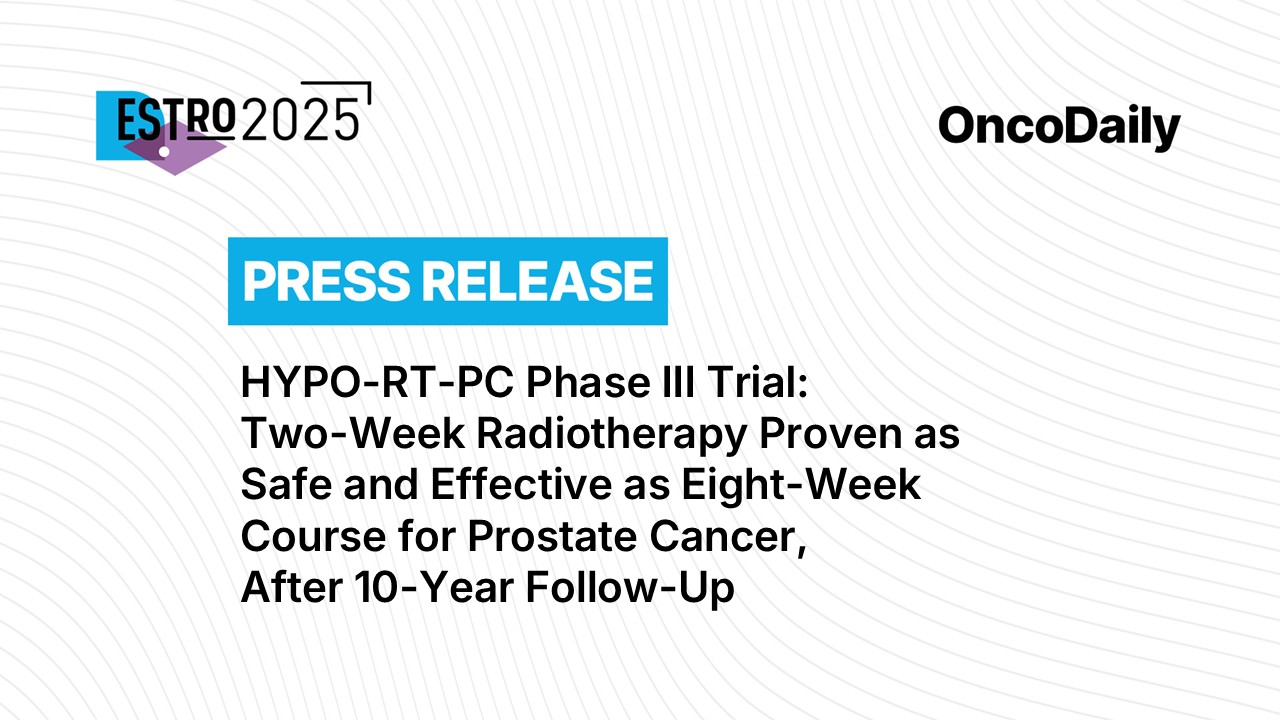Vienna, Austria — Prostate cancer is the most commonly diagnosed cancer in men worldwide, accounting for more than 1.4 million new cases each year [1]. For many patients, radiotherapy is a standard treatment option that offers outcomes comparable to surgery, particularly for localised disease [2]. As an outpatient procedure, it allows men to maintain much of their daily routine during treatment. However, traditional radiotherapy schedules typically span several weeks, which can be burdensome for patients and put pressure on healthcare structures and radiotherapy capacity.
A major clinical trial (HYPO-RT-PC) has shown that a significantly shorter course of radiotherapy for localised prostate cancer is just as safe and effective as the traditional eight-week schedule, even 10 years after treatment. The findings, presented at ESTRO 2025, the annual congress of the European Society for Radiotherapy and Oncology give both patients and doctors greater confidence in choosing this short-course approach, also called “ultra-hypo-fractionated radiotherapy”.
The study, led by researchers in Sweden, found that delivering precision radiotherapy over just two and a half weeks is equally successful in beating prostate cancer as the standard eight-week approach. A decade after treatment, both options produced similar disease control rates and survival.
“These long-term findings confirm previous 5-year results from the trial [3], showing that delivering fewer, higher doses over a shorter period works just as well as the standard approach — not just in theory, but in real-world clinical practice,”
Concluded Associate Professors Per Nilsson, senior radiation physicist, and Adalsteinn Gunnlaugsson, radiation oncologist, who led the 10-year outcome analysis of the HYPO-RT-PC trial, at Skåne University Hospital and Lund University, Sweden.
“For patients, this means less disruption to daily life and potentially lower healthcare costs — without compromising outcomes and safety.”
About the Study
This large phase III clinical trial enrolled 1,200 men with intermediate- to high-risk localised prostate cancer. Participants were randomly assigned to receive either:
- Short-course radiotherapy: 42.7 Gray (Gy) delivered in 7 sessions over 2.5 weeks
- Standard-course radiotherapy: 78.0 Gy delivered in 39 sessions over 8 weeks
Researchers assessed survival, cancer recurrence, and treatment-related side effects, including urinary and bowel symptoms.
Key outcomes after 10 years:
- Failure-free survival (no return of cancer or need for additional treatment): 72% in the short-course group vs 65% in the standard group
- Overall survival: 81% for short-course vs 79% for standard
- Prostate cancer-specific mortality: 4% in both groups
- Side effects: Urinary and bowel symptoms were similar in both groups, and most were mild to moderate.
“These findings confirm that the shorter course does not increase long-term side effects and provides equally durable cancer control”, added Camilla Thellenberg-Karlsson, MD, PhD, at Umeå University, who presented the results at the ESTRO meeting.
Implications for Cancer Care
Prostate cancer is one of the most common cancers in men, and radiotherapy remains a key treatment. These results demonstrate how modern radiotherapy approaches can make treatment more efficient, accessible, and patient-friendly — without sacrificing effectiveness or safety.
Professor Matthias Guckenberger, President of ESTRO, added: “Shorter treatment schedules mean patients can return to their normal lives more quickly.
“Reducing treatment time to just two and a half week is a major win for both patients and health systems. This study exemplifies the kind of impactful, practice-changing research we are proud to showcase at ESTRO 2025.”
References
(1) Sung H et al. Global cancer statistics 2020: GLOBOCAN estimates of incidence and mortality worldwide. CA Cancer J Clin. 2021;71(3):209–49. doi:10.3322/caac.21660
(2) Hamdy FC et al. 15-year outcomes after monitoring, surgery, or radiotherapy for localised prostate cancer. N Engl J Med. 2023;388:1547–58. doi:10.1056/NEJMoa2208606
(3) Widmark A et al. Ultra-hypofractionated versus conventionally fractionated radiotherapy for prostate cancer: 5-year outcomes of the HYPO-RT-PC randomised, non-inferiority, phase 3 trial. Lancet. 2019;394:385-395. doi: 10.1016/S0140-6736(19)31131-6.
About ESTRO 2025
ESTRO 2025 brings together around 7,000 participants from over 80 countries, showcasing the latest research in clinical radiation oncology, radiobiology, medical physics, technology, and brachytherapy. Leading doctors and scientists from around the world present groundbreaking findings, in line with the conference theme: “Transformative innovation through collaboration”. ESTRO 2025 is the annual congress of the European Society for Radiotherapy and Oncology (ESTRO), an organisation dedicated to advancing cancer treatment through radiotherapy and multimodal approaches. ESTRO promotes education, science, and research and advocates for universal access to radiotherapy. With nearly 10,000 members worldwide, it supports radiation oncology professionals and the broader oncology community in their daily practice. For further information, embargoed press materials, or to arrange interviews with the researchers, please contact the ESTRO press office.
Read ESTRO 2025 Updates on OncoDaily



